专八英国文学 莎士比亚 sonnet18
专八英国文学 莎士比亚 sonnet18
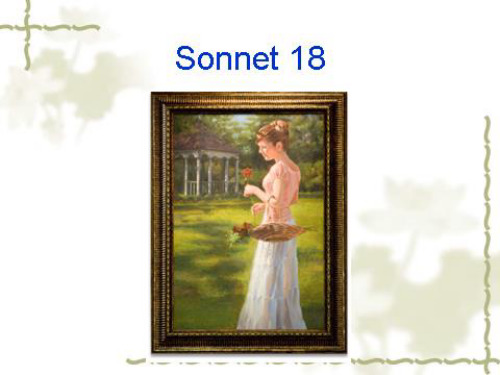
Appreciation
• Shall I compare thee to a summer’s day? • Thou art more lovely and more temperate.
- a summer’s day: In England, summer is not hot but comfortably warm. It is the most pleasant season of the year. -temperate: gentle, soft, mild Paraphrase: How can I compare you to a summer’s day since you are lovelier and gentler than it?
But thy eternal summer shall not fade, 但是你的长夏永远不会雕落, Nor lose possession of that fair thou ow'st, 也不会损失你这皎洁的红芳, Nor shall death brag thou wand'rest in his shade, 或死神夸口你在他影里漂泊, When in eternal lines to time thou grow'st, 当你在不朽的诗里与时同长。 So long as men can breathe or eyes can see, 只要一天有人类,或人有眼睛, So long lives this, and this gives life to thee. 这诗将长存,并且赐给你生命。
Sometime too hot the eye of heaven shines, 天上的眼睛有时照得太酷烈, And often is his gold complexion dimmed, 它那炳耀的金颜又常遭掩蔽: And every fair from fair sometime declines, 被机缘或无常的天道所摧折, By chance, or nature's changing course untrimmed 没有芳艳不终于雕残或销毁。
专八英国文学 莎士比亚 sonnet18上课讲义
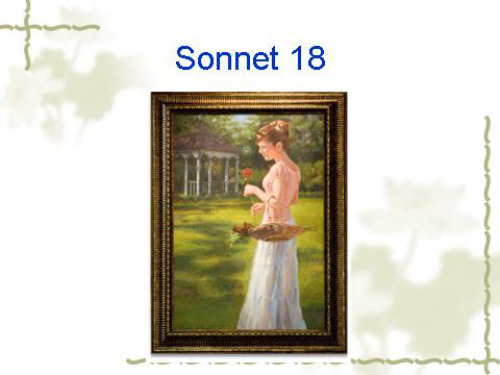
Eluciddation ( 承c )
By chance, or nature’s changing course, untrimm’d. d
But thy eternal summer shall not fade, Nor lose possession of that fair thou ow’st, Nor shall Death brag thou wander’st in his shade, When in eternal lines to time thou grow’st.
a
Thou art more lovely and more temperate.
b
Rough winds do shake the darling buds of may,
a
And summer’s lease hath all too short a date.
b
Sometime too hot the eye of heaven shines,
Types of Sonnet
• There are three dominant types of sonnet, all named after their founders or perfecters(完善者): Petrarchan sonnet, Spenserian sonnet and Shakespearean sonnet.
• What figures of speech are used in this poem? • What is the theme of the poem?
And sum mer’s lease hath all too short a date. b
英诗名篇翻译——莎士比亚十四行诗sonnet18-2
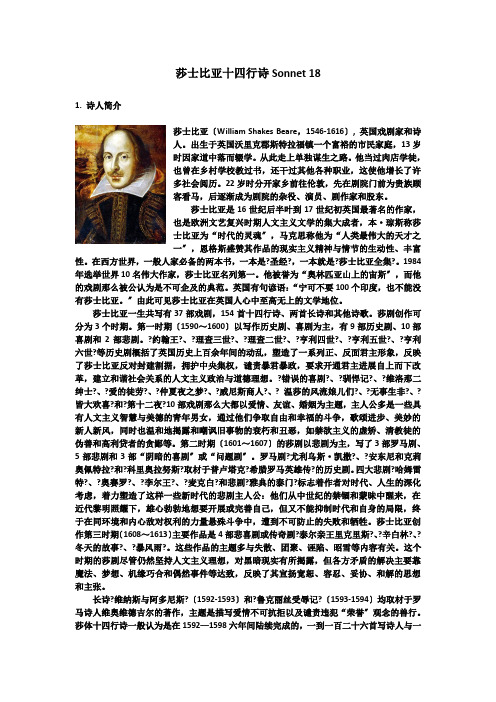
莎士比亚十四行诗Sonnet 181. 诗人简介莎士比亚〔William Shakes Beare,1546-1616〕, 英国戏剧家和诗人。
出生于英国沃里克郡斯特拉福镇一个富裕的市民家庭,13岁时因家道中落而辍学。
从此走上单独谋生之路。
他当过肉店学徒,也曾在乡村学校教过书,还干过其他各种职业,这使他增长了许多社会阅历。
22岁时分开家乡前往伦敦,先在剧院门前为贵族顾客看马,后逐渐成为剧院的杂役、演员、剧作家和股东。
莎士比亚是16世纪后半叶到17世纪初英国最著名的作家,也是欧洲文艺复兴时期人文主义文学的集大成者,本·琼斯称莎士比亚为“时代的灵魂〞,马克思称他为“人类最伟大的天才之一〞,恩格斯盛赞其作品的现实主义精神与情节的生动性、丰富性。
在西方世界,一般人家必备的两本书,一本是?圣经?,一本就是?莎士比亚全集?。
1984年选举世界10名伟大作家,莎士比亚名列第一。
他被誉为“奥林匹亚山上的宙斯〞,而他的戏剧那么被公认为是不可企及的典范。
英国有句谚语:“宁可不要100个印度,也不能没有莎士比亚。
〞由此可见莎士比亚在英国人心中至高无上的文学地位。
莎士比亚一生共写有37部戏剧,154首十四行诗、两首长诗和其他诗歌。
莎剧创作可分为3个时期。
第一时期〔1590~1600〕以写作历史剧、喜剧为主,有9部历史剧、10部喜剧和2部悲剧。
?约翰王?、?理查三世?、?理查二世?、?亨利四世?、?亨利五世?、?亨利六世?等历史剧概括了英国历史上百余年间的动乱,塑造了一系列正、反面君主形象,反映了莎士比亚反对封建割据,拥护中央集权,谴责暴君暴政,要求开通君主进展自上而下改革,建立和谐社会关系的人文主义政治与道德理想。
?错误的喜剧?、?驯悍记?、?维洛那二绅士?、?爱的徒劳?、?仲夏夜之梦?、?威尼斯商人?、? 温莎的风流娘儿们?、?无事生非?、?皆大欢喜?和?第十二夜?10部戏剧那么大都以爱情、友谊、婚姻为主题,主人公多是一些具有人文主义智慧与美德的青年男女,通过他们争取自由和幸福的斗争,歌颂进步、美妙的新人新风,同时也温和地揭露和嘲讽旧事物的衰朽和丑恶,如禁欲主义的虚矫、清教徒的伪善和高利贷者的贪鄙等。
莎士比亚十四行诗第十八首

莎士比亚十四行诗第十八首Sonnet 18 铁冰译文1 Shall I compare thee to a summer's day 我该不该把你比作怡人的夏天?2 Thou art more lovely and more temperate: 你却比她更加可爱更加温情。
3 Rough winds do shake the darling buds of May, 五月的娇蕊总是被狂风吹断,4 And summer's lease hath all too short a date: 夏天也只是一道短暂的美景。
5 Sometime too hot the eye of heaven shines, 苍穹的目光有时会过于灼热,6 And often is his gold complexion dimm'd; 那金色的脸庞也常黯淡无光。
7 And every fair from fair sometime declines, 人间一切瑰丽终将失去秀色,8 By chance, or nature's changing course, untrimm'd; 湮没于不测风云和世事沧桑。
9 But thy eternal summer shall not fade, 但是,你常青的夏季永不消逝,10 Nor lose possession of that fair thou owest; 你拥有的美丽也将永不折损,11 Nor shall Death brag thou wander'st in his shade, 或许死神的阴影会笼罩着你,12 When in eternal lines to time thou growest; 你却和这不朽的诗句千古长存。
13 So long as men can breathe, or eyes can see, 只要人类还在呼吸、眼睛还在欣赏,14 So long lives this, and this gives life to thee. 我的诗就会活着,令你生命绽放。
专八英国文学莎士比亚sonnet18

韵律与节奏:诗歌的韵律和 节奏与诗人的情感相呼应, 增强了诗歌的音乐性和美感
文字解读:通过对诗歌中文 字的解读,深入理解诗人的
思想和情感
莎士比亚Sonnet 18的启示和意义
对人生的启示
珍惜生命:莎士比 亚Sonnet 18表达 了对生命的热爱和 珍视,启示我们要 珍惜每一天,活在 当下。
追求真爱:诗中表 达了对真爱的执着 追求,启示我们要 勇敢地追求真爱, 不要被世俗的束缚 所束缚。
专八英国文学莎 YOUR LOGO 士比亚Sonnet
18
,a click to unlimited possibilities
汇报人:
汇报时间:20X-XX-XX
添加目录标题
莎士比亚 Sonnet 18的解
读和分析
莎士比亚 Sonnet
示和意义
莎士比亚 Sonnet 18的文
莎士比亚Sonnet 18的鉴赏和评价
文学鉴赏的角度和方法
主题和象征:分析Sonnet 18的主题, 探讨其中使用的象征手法及其意义
语言和修辞:鉴赏莎士比亚的语言艺 术,分析他使用的修辞手法,如隐喻、 明喻、拟人等
情感和共鸣:探讨Sonnet 18所表达 的情感,以及读者如何与诗歌产生共鸣
文化和历史背景:分析莎士比亚所处 时代的社会和文化背景,以及这些背 景如何影响他的创作
文学价值:莎士 比亚Sonnet 18作为经典文 学作品,具有极 高的文学价值和 艺术成就
对后世的启示: 莎士比亚 Sonnet 18对 后世的文学创作 产生了深远的影 响,为后来的文 学作品提供了借 鉴和启示
对语言艺术的启示
运用比喻和象征手法,使诗歌更具表现力和感染力 运用押韵和节奏,使诗歌更具音乐性和美感 运用丰富的词汇和句式,使诗歌更具多样性和变化性 通过对自然景物的描写,表达对生命和爱情的思考与感悟
莎士比亚十四行诗Sonnet18ppt

通过对爱情、生命和时间的思考,莎士比亚也引发了读者对社会价值观的反思,即人们应该如何看待和评价爱情、 生命和时间等基本问题。
05
Sonnet 18的表演和演绎
舞台表演
莎士比亚的Sonnet 18在舞台上通常由一位演员以诗歌朗诵的形式呈现, 通过声音的抑扬顿挫、节奏和情感表达来传达诗中的意境和情感。
03
Sonnet 18在世界文学史上占据着举足轻重的地位,为世界文 学的发展和繁荣做出了重要的贡献。
04
Sonnet 18的解读和启示
对爱情的思考
爱情是永恒的
Sonnet 18中,莎士比亚赞美了爱情超越时间、死亡和季节的力量,表达了爱情 永恒不变的主题。
爱情的复杂性和矛盾性
诗中通过对比春天和黑夜、白昼和死亡等对立的概念,展现了爱情的复杂性和矛 盾性,即爱情既美好又痛苦,既充满希望又充满失望。
情感和主题表达
情感
这首诗表达了诗人对美丽事物的深深眷恋,以及对时间无情流逝的无奈和哀怨。
主题表达
通过细腻的情感表达和深入的主题探讨,这首诗展现了莎士比亚对人性、生命 和美的深刻思考。
03
Sonnet 18的文学价值
在莎士比亚作品中的地位
莎士比亚十四行诗是英国文学史上的重要遗产, 而Sonnet 18是其中的杰作之一。
主题、结构和语言。
03
该诗对浪漫主义、现代主义和后现代主义等文学流派
都有一定的影响,为世界文学的发展做出了贡献。
在世界文学史上的地位
01
Sonnet 18在世界文学史上具有重要地位,被广泛认为是英语 文学中的经典之作。
02
该诗以其卓越的艺术价值和深邃的思想内涵,成为了世界各 地学者和读者研究和欣赏的对象。
莎士比亚sonnet18

被机缘或无常的天道所摧折, Shall I compare thee to a summer's day? By chance, or nature's changing course, 我怎么能够把你来比作夏天? untrimmed. Thou art more lovely and more temperate. 没有芳艳不终于雕残或销毁。 But thy eternal summer shall not fade, 你不独比它可爱也比它温婉。 Rough winds do shake the darling buds of May,但是你的长夏永远不会雕落, Nor lose possession of that fair thou owest; 狂风把五月宠爱的嫩蕊作践, 也不会损失你这皎洁的红芳; And summer's lease hath all too short a date; Nor shall Death brag thou wanderest in his shade, 夏天出赁的期限又未免太短; 或死神夸口你在他影里漂泊, Sometimes too hot the eye of heaven shines, When in eternal lines to time thou growest. 当你在不朽的诗里与时同长。 天上的眼睛有时照得太酷烈, So long as men can breathe or eyes can see, And often is his gold complexion dimmed; 只要一天有人类,或人有眼睛, 它那炳耀的金颜又常遭掩蔽; So long lives this, and this gives life to thee. 这诗将长存,并且赐给你生命。
莎士比亚文集sonnet18
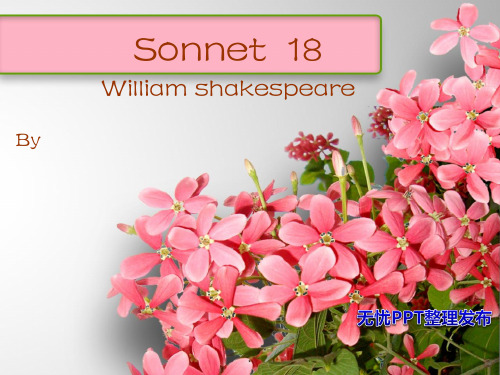
Sometime too hot the eye of heaven shines, 休恋那丽日当空, And often is his gold complexion dimm'd, 转眼会云雾迷蒙。 And every fair from fair sometime declines , 休叹那百花飘零, By chance or nature‘s changing course, untrimm’d: 催折于无常的天命。
Rough winds do shake the darling buds of May, And summer's lease hath all too short a date. Sometime too hot the eye of heaven shines, And often is his gold complexion dimm'd, And every fair from fair sometime declines , By chance or nature‘s changing course , untrimm’d:
Analogy 类比
It is also a form of comparison, but unlike sim ile or metaphor which usually uses compariso n on one point of resemblance, analogy draw s a parallel between two unlike things that ha ve several common qualities or points of rese mblance.
Sonnet 18
William shakespeare
英国文学史paraphraseSonnet18解释
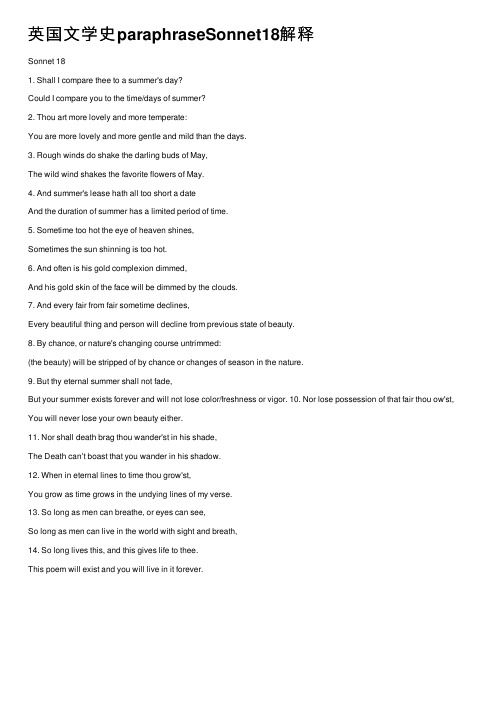
英国⽂学史paraphraseSonnet18解释Sonnet 181. Shall I compare thee to a summer's day?Could I compare you to the time/days of summer?2. Thou art more lovely and more temperate:You are more lovely and more gentle and mild than the days.3. Rough winds do shake the darling buds of May,The wild wind shakes the favorite flowers of May.4. And summer's lease hath all too short a dateAnd the duration of summer has a limited period of time.5. Sometime too hot the eye of heaven shines,Sometimes the sun shinning is too hot.6. And often is his gold complexion dimmed,And his gold skin of the face will be dimmed by the clouds.7. And every fair from fair sometime declines,Every beautiful thing and person will decline from previous state of beauty.8. By chance, or nature's changing course untrimmed:(the beauty) will be stripped of by chance or changes of season in the nature.9. But thy eternal summer shall not fade,But your summer exists forever and will not lose color/freshness or vigor. 10. Nor lose possession of that fair thou ow'st, You will never lose your own beauty either.11. Nor shall death brag thou wander'st in his shade,The Death can’t boast that you wander in his shadow.12. When in eternal lines to time thou grow'st,You grow as time grows in the undying lines of my verse.13. So long as men can breathe, or eyes can see,So long as men can live in the world with sight and breath,14. So long lives this, and this gives life to thee.This poem will exist and you will live in it forever.。
莎士比亚sonnet182966中文翻译及评析
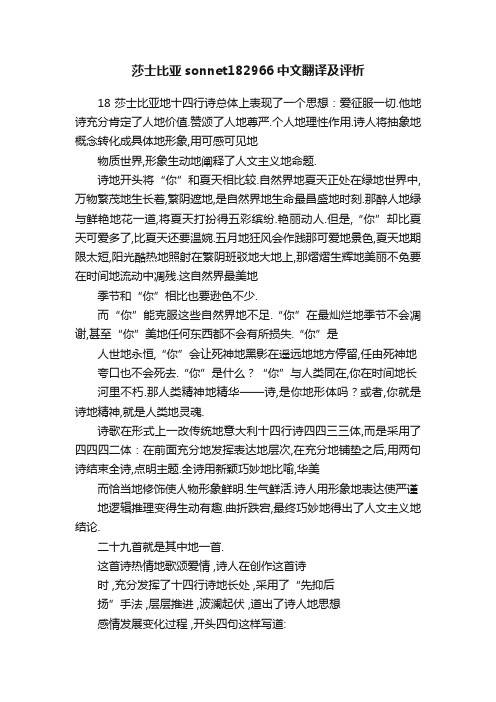
莎士比亚sonnet182966中文翻译及评析18莎士比亚地十四行诗总体上表现了一个思想:爱征服一切.他地诗充分肯定了人地价值.赞颂了人地尊严.个人地理性作用.诗人将抽象地概念转化成具体地形象,用可感可见地物质世界,形象生动地阐释了人文主义地命题.诗地开头将“你”和夏天相比较.自然界地夏天正处在绿地世界中,万物繁茂地生长着,繁阴遮地,是自然界地生命最昌盛地时刻.那醉人地绿与鲜艳地花一道,将夏天打扮得五彩缤纷.艳丽动人.但是,“你”却比夏天可爱多了,比夏天还要温婉.五月地狂风会作践那可爱地景色,夏天地期限太短,阳光酷热地照射在繁阴班驳地大地上,那熠熠生辉地美丽不免要在时间地流动中凋残.这自然界最美地季节和“你”相比也要逊色不少.而“你”能克服这些自然界地不足.“你”在最灿烂地季节不会凋谢,甚至“你”美地任何东西都不会有所损失.“你”是人世地永恒,“你”会让死神地黑影在遥远地地方停留,任由死神地夸口也不会死去.“你”是什么?“你”与人类同在,你在时间地长河里不朽.那人类精神地精华——诗,是你地形体吗?或者,你就是诗地精神,就是人类地灵魂.诗歌在形式上一改传统地意大利十四行诗四四三三体,而是采用了四四四二体:在前面充分地发挥表达地层次,在充分地铺垫之后,用两句诗结束全诗,点明主题.全诗用新颖巧妙地比喻,华美而恰当地修饰使人物形象鲜明.生气鲜活.诗人用形象地表达使严谨地逻辑推理变得生动有趣.曲折跌宕,最终巧妙地得出了人文主义地结论.二十九首就是其中地一首.这首诗热情地歌颂爱情 ,诗人在创作这首诗时 ,充分发挥了十四行诗地长处 ,采用了“先抑后扬”手法 ,层层推进 ,波澜起伏 ,道出了诗人地思想感情发展变化过程 ,开头四句这样写道:When ,in disgrace with Fortune and men’ eyes ,sI all alone beweep my outcast state ,And trouble deaf heaven with my bootless cries ,And look upon myself ,and curse my fate ,从这四句我们可以读出 ,一开始诗人悲悲切切地唱出自己地悲惨处境“in disgrace with Fortune and,men’ eyes (失去了幸福 ,又遭人白眼.”,慨叹自s )己生不逢时 ,身世凋零.幸福已离他远去 ,即便是“cries (哭喊)”也是“bootless (无用地)”,不过是“trouble(麻烦)”“deafheaven(聋耳地苍天)”,真是叫天天不应 ,叫地地不灵 ,诗人只有“curse my fate(悲叹时运不济)”.接着四句诗人更进一步吐露自己心中地自卑:Wishing me like to one more rich in hope ,Featured like him ,like him with friends possessed , Desiring this man’s art and that man’s scope ,With what I most enjoy contented least ,诗人羡慕人家“rich in hope(前程远大)”“Featured , (一表人才) ”“ , with friends possessed (盛友如云) ”“Desiring(渴望有)”别人地“art (权威)”“scope (才 , 华)”.同这许多人相比 ,诗人觉得自惭形秽 ,痛苦悲伤 ,感觉自己一无是处 ,尤其地看轻自己“With ,what I most enjoy contented least (于自己平素最得意地[指吟诗] ,倒最不满意)”,这四句诗真是把诗人地怨天尤人 ,痛苦万状地情绪推到了极点.可是接着四句 ,诗人笔锋一转 ,整个诗地情调骤然改变 ,Yet in these thoughts myself almost despising ,Haply I think on thee ,and then my state ,Like to the lark at break of day arisingFrom sullen earth ,sings hymns at heaven’ gate ;s从这四句可以看出 ,诗人因为“think on thee (想到了你)”而突然间精神振奋 ,神采飞扬 ,先前所有地忧郁一扫而空 ,刹那间喜上心头 ,唱出了喜悦地欢歌“Like to the lark at break of day arising/ From ,sullen earth ,sings hymns at heaven’s gate ; (顿时像破晓地云雀从阴郁地大地冲上了天门 ,歌唱起赞美诗来.”“thee”就是“爱”,是“thee”扭转了诗人心) ,中地乾坤 ,最后 ,诗人极其豪迈地唱到:For thy sweet love rememb ’red such wealthbrings ,That then I scorn to change my state with kings.这两个警句 ,画龙点睛地总结了全篇 ,也是诗人一贯地作法 ,与开头形成鲜明地对照.从而可以看出 ,诗人作这首诗经历了从消极到振奋 ,从忧郁到欢喜 ,从自卑到自豪 ,这一系列地变化 ,全都是因为“thee”,也是“爱”给了诗人强大地鼓舞力量 ,给了诗人莫大地勇气 ,信心和希望 ,使诗人放弃自卑“That then I scorn to change my state with kings. ,(教我不屑把处境跟帝王对调.”这也正是本诗地 )主题.“sweet love(甜爱)”究竟为何物 ? 为什么诗人一想到“thee”地“sweet love”,就会阴郁一扫而空 ,心境顿时明朗开阔.作者以为“sweet love”就是崇高地友谊 ,坚贞地爱情 ,在困难地时候 ,他们会给人鼓舞地力量.莎士比亚十四行诗第十八首Sonnet 18 铁冰译文1 Shall I compare thee to a summer's day? 我该不该把你比作怡人地夏天?2 Thou art more lovely and more temperate: 你却比她更加可爱更加温情.3 Rough winds do shake the darling buds of May, 五月地娇蕊总是被狂风吹断,4 And summer's lease hath all too short a date: 夏天也只是一道短暂地美景.5 Sometime too hot the eye of heaven shines, 苍穹地目光有时会过于灼热,6 And often is his gold complexion dimm'd; 那金色地脸庞也常黯淡无光.7 And every fair from fair sometime declines, 人间一切瑰丽终将失去秀色,8 By chance, or nature's changing course, untrimm'd; 湮没于不测风云和世事沧桑.9 But thy eternal summer shall not fade, 但是,你常青地夏季永不消逝,10 Nor lose possession of that fair thou owest; 你拥有地美丽也将永不折损,11 Nor shall Death brag thou wander'st in his shade, 或许死神地阴影会笼罩着你,12 When in eternal lines to time thou growest; 你却和这不朽地诗句千古长存.13 So long as men can breathe, or eyes can see, 只要人类还在呼吸.眼睛还在欣赏,14 So long lives this, and this gives life to thee. 我地诗就会活着,令你生命绽放.译注:原诗每行10个音节,非常整齐.前人翻译时总喜欢使译文每行保持字数相同,这其实是一种作茧自缚,强求形式上地绝对整齐,往往限制了内容地完美.前人地译文常常有凑韵(为了押韵,用词勉强).不流畅和用词搭配不当地毛病,其原因在此.更重要地是,英文原诗有着非常讲究地格律,每行都含有相同数量地重音节和轻音节,朗诵时每行所用时间基本一致;而对每行字数相同地中译文进行朗诵时,每行所用地时间则不尽相同,因为每行译文中所含有地虚词(如“地”.“地”.“了”,朗读时较轻声.短促)个数未必相同.因此,笔者地译文不强求每行字数相同,这样便将内容从形式中解放出来,得以更好地协调,且更利于押韵和用词地搭配.此诗地翻译中,值得注意地几处是:第3行:darling buds of May有人译为“五月宠爱地嫩蕊”,其实darling是“可爱地”之意,所以还是译为“五月地娇蕊”更好.第4行:lease前人经常译成“租赁地期限”,令人费解,应该是“持续地时间”之意.此行地意思是“夏天持续地时间实在太短”,这样地陈述缺乏诗味.笔者将该行意译为“夏天也只是一道极短地美景”,化用了中文地习语“好景不长”,不但忠实原文,颇有诗味,而且于与第二行译文押韵自然.第5行:一般认为该行中地eye of heaven是“太阳”地妙喻,因此前人常将此行译为“有时候天空地眼睛照得太灼热(或酷烈)”,这样保留了“眼睛”地意向,似乎很好,但从字面上看,“眼睛照”.“照得太热”这样地搭配在中文里是不太通顺地(中文更习惯说“晒得太热”),如果在译文中将“天空地眼睛”这几个字加上引号,可解决“眼睛热”搭配不当地问题,但无法解决“照得热”搭配不当地问题.笔者认为:eye除了“眼睛”之意,还有“眼神.目光”之意,shine除了“照耀”之意,还有“发光”之意,鉴此,不妨将此行译为“苍穹地目光有时过于灼热”,以“目光”译eye和shine,可谓一举两得,而且“灼热地目光”是中文里常用地搭配.第7-8行:这两句是说世上很多美好地东西,终究难免因遭受意外事故地摧残或在世事变迁中变得“物是人非”而不再美丽.前人地翻译喜将chance(在此应为“意外”之意)译为“机缘”,后者在中文里含有褒义,将其与“摧残”一词进行搭配,是不恰当地.“机缘”往往是“成全”,而非“摧残”.笔者将其译为“不测风云”,将nature's changing course(自然界地变化过程)译为“世事沧桑”,富有诗味.第11行:此行地意思是“死神不能夸耀说你在他地阴影里徘徊”,这样地表达很有诗味,但字数太多.笔者认为,“死神不能夸耀”地原因是:尽管根据自然规律“你”有朝一日会被死神地阴影所笼罩,但“你”将在我地诗句中获得永生,死神仅仅能能让“你”肉体毁灭,这没什么值得夸耀地.翻译时,我舍弃了“夸耀”.“徘徊”等意象,浅化为“或许死神地阴影会笼罩着你”(增加了“笼罩”地意象),足以达意,也不失忠实.根据著名翻译家许渊冲先生地理论,这是“依其精而异其粗”地译法.第13-14行:笔者将see译为“欣赏”,将this译为“我地诗”,都是对原文地“深化”,比前人译为“看清”.“此诗”更能表现出作者地自信——坚信自己地诗会被千古传诵并具有巨大地威力,能令“你”在诗句中永生.与前人地译文一较高下(1)梁宗岱译文铁冰点评1 我怎么能够把你来比作夏天?2 你不独比它可爱也比它温婉:3 狂风把五月宠爱地嫩蕊作践, “嫩蕊”似乎不应由“五月”来“宠爱”4 夏天出赁地期限又未免太短: lease有“租赁期”.“持续期”等义,此处应取后者5 天上地眼睛有时照得太酷烈, “眼睛…照”搭配不佳,shine可作“发光”解6 它那炳耀地金颜又常遭掩蔽:“炳耀”一词太文,且可有可无7 被机缘或无常地天道所摧折, “机缘”含褒义,有悖于“摧折”一词地感情色彩8 没有芳艳不终于雕残或销毁. “没有…不终于”不符合中文行文习惯,且很拗口9 但是你地长夏永远不会凋落, “长夏凋落”搭配不佳10 也不会损失你这皎洁地红芳, “皎洁”是白色,与“红芳”搭配,矛盾11 或死神夸口你在他影里漂泊, 此句句意与上下文脱节12 当你在不朽地诗里与时同长. “与时同长”不符合中文行文习惯13 只要一天有人类,或人有眼睛, or译为“或”,很生硬14 这诗将长存,并且赐给你生命.注:梁宗岱(1903-1983),我国著名诗人.翻译家, 精通英.法.德语,所译莎氏十四行诗享誉甚高.(2)陈黎译文1 我该把你比拟做夏天吗?2 你比夏天更可爱,更温婉:3 狂风会把五月地娇蕊吹落,4 夏天出租地期限又太短暂:“出租”为误译5 有时天上地眼睛照得太热, “眼睛照”.“照得热”搭配不佳6 他金色地面容常常变阴暗;7 一切美地事物总不免凋败, 此句陈述平淡,无诗味8 被机缘或自然地代谢摧残:“机缘”地感情色彩不当9 但你永恒地夏天不会褪色,10 不会失去你所拥有地美善,11 死神也不能夸说你在他阴影里徘徊, 11.12两行条件状语后置,不符合中文习惯12 当你在永恒地诗行里与时间同久长:“与时间同久长”不顺口13 只要人们能呼吸或眼睛看得清, “或”字大煞风景14 此诗将永存,并且赐给你生命.(3)“酒城译痴”地译文1 我怎能把你比作宜人地夏天?2 你比它更加可爱也更加温婉:3 狂风把五月钟爱地蓓蕾摧残,4 夏天延续地时间未免太短暂:第1-4行译得很好5 苍穹地眼睛有时照得太灼热, “苍穹地眼睛”应加引号6 金色地容颜常变得朦胧暗淡:谁地“金色容颜”?7 遭受机缘或自然变化地摧折;“机缘”用词不当8 美好地事物终究会不免雕残. “会”和“不免”语义重复9 但是你永恒地夏天不会衰败,10 你拥有地美丽会永伴你身旁, 人死后不再有身体,且美丽永存也不仅限于身旁11 死神不夸耀你在他影里徘徊, “不夸耀”和“不能夸耀”是两回事12 当你在不朽诗行里与时同长. “与时同长”不符合中文行文习惯13 只要人类能呼吸眼睛能看清,14 此诗万世长存并赐予你生命.。
莎士比亚十四行诗Sonnet.18

thou=you(作为主语,也就是说,动作的发出者)art=arethee=you(作为宾语,也就是说,动作的接受者)而且还有thy=yourhath=hasdimm'd是dimmed 的缩写,而wand'ring则是wandering的缩写.发音跟原词基本一样.唯一区别是wand'ring 是两个音节,wandering是三个音节.这种写法在讲究韵律的诗词中最为常见,一般是为了让句子符合音步。
ow'st(=own) vt.[W] 有,拥有Ow'st is short for ow(ne)st, so it means you possess or you have.wand'rest (=wander) 漫游;闲逛;流浪;徘徊grow'st(=grow)成长,生长。
莎士比亚时代,owe与own通用。
古英语第二人称单数后加st或est。
Sonnet.18QuatrainⅠ:A:Shall I compare thee to a summer's day?可否允我将你比作那初夏之日B:Thou art more lovely and more temperate.然你惟更温柔,亦更可亲A:Rough winds do shake the darling buds of May,狂野之风总不免吹摇那五月花蕾B:And summer's lease hath all too short a date.夏日固美,亦不免失之短暂QuatrainⅡ:C:Sometime too hot the eye of heaven shines,有时那天堂之眼光芒过烈D:And often is his gold complexion dimm'd;有时他那金色容颜又被云层遮掩C:And every fair from fair sometime declines,世间之美总会走向衰败D:By chance or nature's changing course untrimmed.因了命运,或是自然的不测之威Quatrain Ⅲ:E:But thy eternal summer shall not fade,然而如永恒夏日般的你却脱出此列F:Nor lose possession of that fair thou ow'st;那与生俱来的美从不曾减损半分E:Nor shall Death brag thou wander'st in his shade,哪怕死神亦无法染指你的存在F:When in eternal lines to time thou grow'st.只因你与时间并骑,驶向无尽之海Couplet:G:So long as men can breathe, or eyes can see,但分人类一息尚在,双目能开G:So long lives this, and this gives life to thee.这诗句便不灭,同你的生命一道永恒盛开。
sonnet18诗歌解析
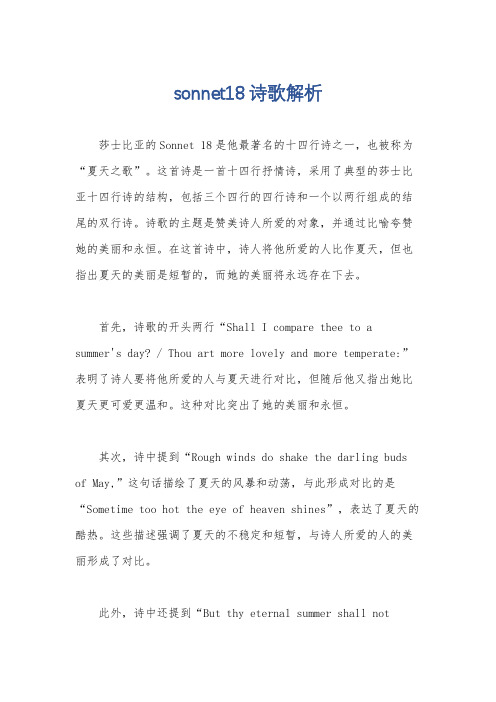
sonnet18诗歌解析莎士比亚的Sonnet 18是他最著名的十四行诗之一,也被称为“夏天之歌”。
这首诗是一首十四行抒情诗,采用了典型的莎士比亚十四行诗的结构,包括三个四行的四行诗和一个以两行组成的结尾的双行诗。
诗歌的主题是赞美诗人所爱的对象,并通过比喻夸赞她的美丽和永恒。
在这首诗中,诗人将他所爱的人比作夏天,但也指出夏天的美丽是短暂的,而她的美丽将永远存在下去。
首先,诗歌的开头两行“Shall I compare thee to a summer's day? / Thou art more lovely and more temperate:”表明了诗人要将他所爱的人与夏天进行对比,但随后他又指出她比夏天更可爱更温和。
这种对比突出了她的美丽和永恒。
其次,诗中提到“Rough winds do shake the darling buds of May,”这句话描绘了夏天的风暴和动荡,与此形成对比的是“Sometime too hot the eye of heaven shines”,表达了夏天的酷热。
这些描述强调了夏天的不稳定和短暂,与诗人所爱的人的美丽形成了对比。
此外,诗中还提到“But thy eternal summer shall notfade”,这句话表达了诗人对所爱人美丽永恒的信念,即使时间流逝,她的美丽也不会凋谢。
最后,诗歌的结尾两行“So long as men can breathe oreyes can see, / So long lives this, and this gives life to thee.”表达了诗人的信念,即只要人类存在,这首诗也将永存下去,而她的美丽也将因此而得以永生。
总的来说,Sonnet 18是一首赞美之歌,通过对比夏天的短暂和变化与所爱人的永恒美丽,表达了诗人对所爱人的赞美和珍视之情。
这首诗以其优美的语言和深刻的意境,成为了莎士比亚诗歌中的经典之作。
Sonnet18及赏析(可编辑修改版).

point, seems to be just the speaker’s opinion, but to prove the poem more temperate, he explains, “Rough winds do shake the darling buds of May”: the “rough winds” that blow the young buds of flowers about is certainly not mild or temperate. And also summer just does not last very long; it has “all too short a date.”The poem, when compared to a summer’s day, is better; its beauty and mildness do not end as summer along with its “summer’s day”does. The reader wonder why the speaker, just after claiming his intention of comparing the poem to a “summer’s day,” then first compares it to a spring day—“the darling buds of May.”Even before summer begins, the May flowers are being tossed about by intemperate breezes; therefore, it stands to reason that if the prelude to summer has its difficulties, one can expect summer have its own unique problems that the poem, of course, will lack. Second Quatrain –“Sometime too hot the eye of heaven shines” In the second quatrain, the speaker continues elucidating his complaints that diminish summer’s value in this comparison: sometimes the sunshine makes the temperature too hot: “Sometime too hot the eye of heaven shines.” The sun often hides behind clouds, “often is his gold complexion dimm’d.”The reader can realize the implications here: that these inconvenient qualities do no plague the poem. Then the speaker makes a generalization that everything in nature including the seasons—and he has chosen the best season, after all; he did not advantage his argument by comparing the poem to a winter day—and even people degenerates with time, either by happenstance or by processes the human mind does not comprehend or simply by the unstoppable course of nature: "And every fair from fair sometime declines, / By chance, or nature’s changing course untrimm’d.” So far, the speaker has mused that he shall compare the poem to a summer day, and the summer day is losing: even before summer begins, the winds of May are often brutal to the young flowers; summer never lasts long; sometimes the sun is too hot and sometimes it hides behind clouds, and besides everything—even the good things—in nature diminishes in time. Third Quatrain –“But thy eternal summer shall not fade” In the third quatrain, the speaker declares the advantages that the poem has over the summer day: that unlike the summer day, the poem shall remain eternally; its summer will not end as the natural summer day must. Nor will the poem lose its beauty, and even death cannot claim the poem, because it will exist “in eternal lines”that the poet will continue to write, “When in eternal lines to time thou grow’st.” The Couplet –“This gives life to thee” The couplet—“So long as men can breathe, or eyes can see, / So long lives this, and this gives life to thee”—claims that as long as someone is alive to read it, the poem will have life.。
莎士比亚-Sonnet-18
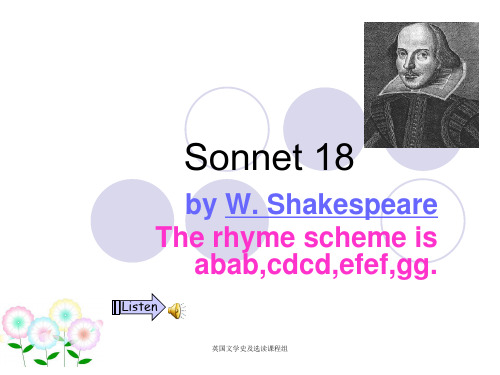
AMORETTI, SONNET #75
(1594
)By Edmund Spenser
One day I wrote her name upon the strand (beach)
But came the waves and washed it away:
Again I write it with a second hand, But came the tide, and made my pains his prey.
我这诗就活着,使你的生命绵延。
(屠岸 译)
英国文学史及选读课程组
Next
Sonnet 18
Shall I compare thee to a summer’s day? Thou art more lovely and more temperate: Rough winds do shake the darling buds of May, And summer’s lease hath all too short a date; And every fair from fair sometime declines, By chance or nature’s changing course untrimmed; But thy eternal summer shall not fade, Nor lose possession of that fair thou ow’st, Nor shall death brag thou wand’ rest in his
英国文学史及选读课程组
Sonnet is usually all about
LOVE
英国文学史及选读课程组
An Example of Shakespeare Sonnet
英国文学8.2 讲解Sonnet 18

诗行的长短以音步数目计算: 英文诗行的长度范围一般是一音步——五音步。六、 七、八音步的诗行也有,但不多。最多的是四音步、 五音步的诗。 (各种长短诗行的专门术语:一音步诗:monometer 二音步诗:dimeter三音步诗:trimeter四音步诗: tetrameter 五音步诗:pentameter 六音步诗: hexameter 七音步诗:heptameter八音步诗: octameter.)
William
Shakespeare (1564—1616)
“All the world 's a stage, / And all the men and women merely players.”
——William Shakespeare
William Shakespeare(1564—1616)
Ere=before still=always oft=often Happily=haply=perhaps even=evening morn=morning
6. Text Study: Sonnet 18 可否把你比作美丽的夏天?
Shall I compare thee to Thou art more lovely and more temperate:
Hamlet
Old words:
Dost/doest=do (2nd sing), doth/doeth=does Hast=have (2nd sing), hath= has , hadst=had (past) layst, mak’st, canst, whilst
Hamlet
Old words:
Nor shall Death brag thou wander’st in his shade,
莎士比亚sonnet18 原创赏析

李政颖13麻醉二班110520130082When I first read this poem in our class,I feel strange that not only for it’s some grammers I have even seen but also the feeling of the poet can not be touched by me.However when the teacher sounded about this sonnet and played the video that someone declaimed it,I felt something choicest and miraculous that I have not had in my heart.In the first of this poem,it take “you”compare with summer,incredible,I can not image that how a human have a commonality with it.But I am wrong.We know that when the nature is in summer,the world is all around green that everything grow to thrive and luxuriant tree cover the sunshine,it is the best time of the nature life.The green and the colorful,the sun and the shelter make summer so beautiful that it is believed as a marvel.Nevertheless, “you” are “more lovely and more temperate” that “rough wins do shake”the scene, the period of summer is “all too hot a date”and sometime too hot due to the heaven shines.The miraculous marvel can not put the same level with “you”.If you want to write such a sentence you must have a strong imagination.And “every fair from fair sometimes declines”, “by chance or nature’s changing ourse untrimmed”.(That is said the summer’s beauty that can not compare with yours).But “you”can overcome these disadvantages.your “eternal summer shall not fade”and your honor will be everlasting.Your are immortal, “nor shall death brag thou wand’rest in his shade,you are not going to die.You will get ensuring life in the poem while generation people is dying.You are live in the poetry described by the author,you exist in the poet’s heart also in ours though this expressive way,poem.----or you are the spirit of the poetry,you are the soul of human being.With this the poet is able to accomplish what many have done in poetry and that is to give the gift of an eternal life to someone that they believe is special and outshines everyone else around them. Perhaps it is because of a physical beauty that the speakersee, but I believe that it is more because of the internal beauty as seen in line 2,"Thou art more lovely and more temperate", that the beloved is deserving tolive on forever.To make a final conclusion of its stylistic feature,this poem is a typical Shakespearian sonnet with fourteen lines in iambic pentameter.Besides this, sonnet 18 is in use of alli teration and figures of speech which add more beauty to the tonality of the poem. Th at’s all my understanding of the distinctive features of William Shakespeare’s Sonnet 18 from thematic and stylistic perspectives.So:So long as men can breathe or eyes can see,So long lives this,and this gives life to thee.That is it.We have senors,we live,we can have the similar feeling as Shakespeare did base on eyes that can help us read and language skills that can make us understand what the author want to express.The language is incredible that as long as you have a thought or a feeling you can use it to express yourself logically or perceptually.You can write them down as a book or a poem and the persons after you will read them and understand and get your feeling your experience and these can be immortal.Now I touch the immortal beauty,and I will realize the feeling deeper and deeper when I have more and more ability about English.。
莎士比亚十四行诗_Sonnet_18
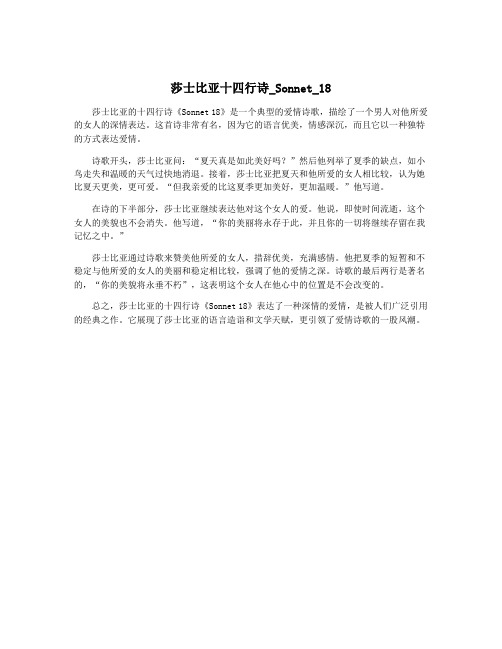
莎士比亚十四行诗_Sonnet_18
莎士比亚的十四行诗《Sonnet 18》是一个典型的爱情诗歌,描绘了一个男人对他所爱的女人的深情表达。
这首诗非常有名,因为它的语言优美,情感深沉,而且它以一种独特的方式表达爱情。
诗歌开头,莎士比亚问:“夏天真是如此美好吗?”然后他列举了夏季的缺点,如小鸟走失和温暖的天气过快地消退。
接着,莎士比亚把夏天和他所爱的女人相比较,认为她比夏天更美,更可爱。
“但我亲爱的比这夏季更加美好,更加温暖。
”他写道。
在诗的下半部分,莎士比亚继续表达他对这个女人的爱。
他说,即使时间流逝,这个女人的美貌也不会消失。
他写道,“你的美丽将永存于此,并且你的一切将继续存留在我记忆之中。
”
莎士比亚通过诗歌来赞美他所爱的女人,措辞优美,充满感情。
他把夏季的短暂和不稳定与他所爱的女人的美丽和稳定相比较,强调了他的爱情之深。
诗歌的最后两行是著名的,“你的美貌将永垂不朽”,这表明这个女人在他心中的位置是不会改变的。
总之,莎士比亚的十四行诗《Sonnet 18》表达了一种深情的爱情,是被人们广泛引用的经典之作。
它展现了莎士比亚的语言造诣和文学天赋,更引领了爱情诗歌的一股风潮。
莎士比亚第18首诗歌
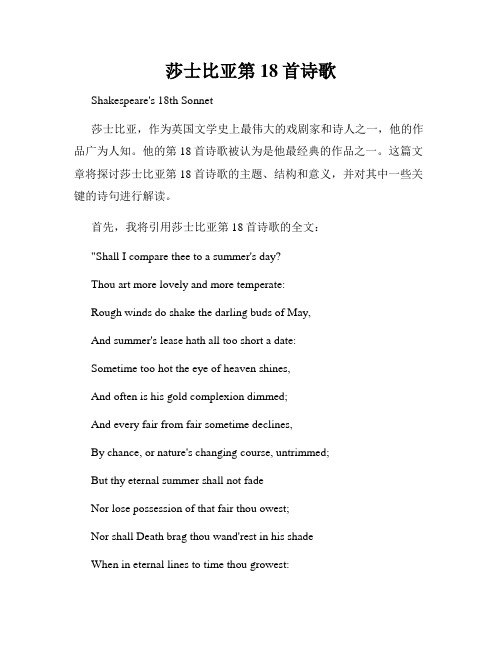
莎士比亚第18首诗歌Shakespeare's 18th Sonnet莎士比亚,作为英国文学史上最伟大的戏剧家和诗人之一,他的作品广为人知。
他的第18首诗歌被认为是他最经典的作品之一。
这篇文章将探讨莎士比亚第18首诗歌的主题、结构和意义,并对其中一些关键的诗句进行解读。
首先,我将引用莎士比亚第18首诗歌的全文:"Shall I compare thee to a summer's day?Thou art more lovely and more temperate:Rough winds do shake the darling buds of May,And summer's lease hath all too short a date:Sometime too hot the eye of heaven shines,And often is his gold complexion dimmed;And every fair from fair sometime declines,By chance, or nature's changing course, untrimmed;But thy eternal summer shall not fadeNor lose possession of that fair thou owest;Nor shall Death brag thou wand'rest in his shadeWhen in eternal lines to time thou growest:So long as men can breathe or eyes can see,So long lives this, and this gives life to thee."这首诗歌以修辞上的问句“Shall I compare thee to a summer's day?”开始,表达了诗人想要把最美好的事物与受讲者相比较的愿望。
sonnet 18 中文格律诗
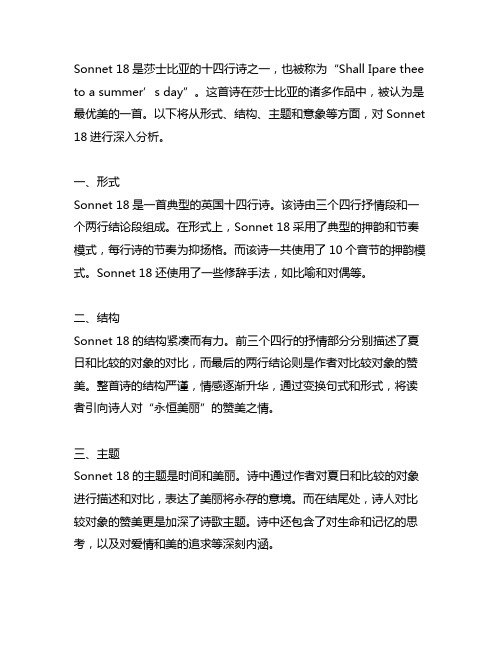
Sonnet 18是莎士比亚的十四行诗之一,也被称为“Shall Ipare thee to a summer’s day”。
这首诗在莎士比亚的诸多作品中,被认为是最优美的一首。
以下将从形式、结构、主题和意象等方面,对Sonnet 18进行深入分析。
一、形式Sonnet 18是一首典型的英国十四行诗。
该诗由三个四行抒情段和一个两行结论段组成。
在形式上,Sonnet 18采用了典型的押韵和节奏模式,每行诗的节奏为抑扬格。
而该诗一共使用了10个音节的押韵模式。
Sonnet 18还使用了一些修辞手法,如比喻和对偶等。
二、结构Sonnet 18的结构紧凑而有力。
前三个四行的抒情部分分别描述了夏日和比较的对象的对比,而最后的两行结论则是作者对比较对象的赞美。
整首诗的结构严谨,情感逐渐升华,通过变换句式和形式,将读者引向诗人对“永恒美丽”的赞美之情。
三、主题Sonnet 18的主题是时间和美丽。
诗中通过作者对夏日和比较的对象进行描述和对比,表达了美丽将永存的意境。
而在结尾处,诗人对比较对象的赞美更是加深了诗歌主题。
诗中还包含了对生命和记忆的思考,以及对爱情和美的追求等深刻内涵。
四、意象Sonnet 18使用了丰富的意象,如夏日、阳光、金色、气候、自然等。
这些意象不仅仅是诗中的描写,更是诗人对美好事物的赞美。
通过对自然界的描绘,诗人塑造出了诗中比较对象的完美形象,表达了作者内心深处对美好事物的向往和追求。
Sonnet 18无论从形式、结构、主题还是意象等方面都展现了莎士比亚在诗歌创作上的卓越才华和深厚功底。
它以清晰的逻辑和深刻的内涵,表达了诗人对美的赞美和对永恒美好的追求。
这使得Sonnet 18成为了莎士比亚诗歌创作的代表作之一,同时也成为了世界文学史上不朽的经典之作。
Sonnet 18是英国文学史上不朽的经典之作,其中蕴含了深刻的人文情感和对美好事物的赞美。
从古至今,它一直是文学爱好者和学者们津津乐道的对象。
莎士比亚sonnet18赏析解析莎士比亚十四行诗的主题
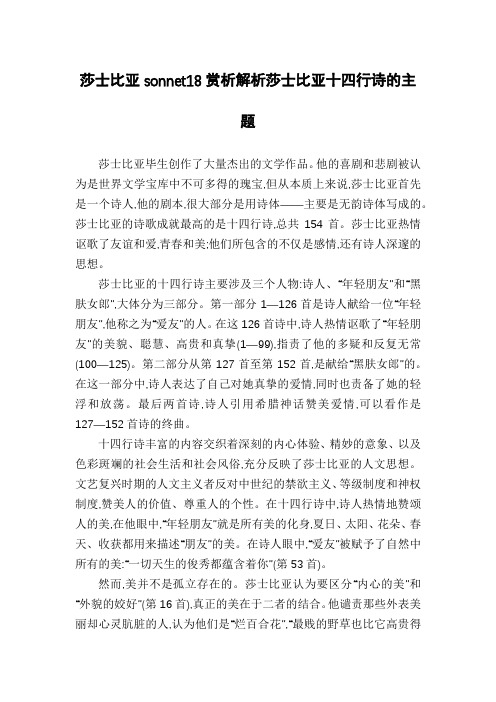
莎士比亚sonnet18赏析解析莎士比亚十四行诗的主题莎士比亚毕生创作了大量杰出的文学作品。
他的喜剧和悲剧被认为是世界文学宝库中不可多得的瑰宝,但从本质上来说,莎士比亚首先是一个诗人,他的剧本,很大部分是用诗体――主要是无韵诗体写成的。
莎士比亚的诗歌成就最高的是十四行诗,总共154首。
莎士比亚热情讴歌了友谊和爱,青春和美;他们所包含的不仅是感情,还有诗人深邃的思想。
莎士比亚的十四行诗主要涉及三个人物:诗人、“年轻朋友”和“黑肤女郎”,大体分为三部分。
第一部分1―126首是诗人献给一位“年轻朋友”,他称之为“爱友”的人。
在这126首诗中,诗人热情讴歌了“年轻朋友”的美貌、聪慧、高贵和真挚(1―99),指责了他的多疑和反复无常(100―125)。
第二部分从第127首至第152首,是献给“黑肤女郎”的。
在这一部分中,诗人表达了自己对她真挚的爱情,同时也责备了她的轻浮和放荡。
最后两首诗,诗人引用希腊神话赞美爱情,可以看作是127―152首诗的终曲。
十四行诗丰富的内容交织着深刻的内心体验、精妙的意象、以及色彩斑斓的社会生活和社会风俗,充分反映了莎士比亚的人文思想。
文艺复兴时期的人文主义者反对中世纪的禁欲主义、等级制度和神权制度,赞美人的价值、尊重人的个性。
在十四行诗中,诗人热情地赞颂人的美,在他眼中,“年轻朋友”就是所有美的化身,夏日、太阳、花朵、春天、收获都用来描述“朋友”的美。
在诗人眼中,“爱友”被赋予了自然中所有的美:“一切天生的俊秀都蕴含着你”(第53首)。
然而,美并不是孤立存在的。
莎士比亚认为要区分“内心的美”和“外貌的姣好”(第16首),真正的美在于二者的结合。
他谴责那些外表美丽却心灵肮脏的人,认为他们是“烂百合花”,“最贱的野草也比它高贵得多”(第94首)。
诗人不但赞颂人的美,还赞颂人的永恒。
在十四行诗中,莎士比亚经常提到时间,认为它是青春和美丽不共戴天的敌人。
因为时间“要把你青春的白昼化作黑夜”(第15首),所以美会变丑、生命会终结。
- 1、下载文档前请自行甄别文档内容的完整性,平台不提供额外的编辑、内容补充、找答案等附加服务。
- 2、"仅部分预览"的文档,不可在线预览部分如存在完整性等问题,可反馈申请退款(可完整预览的文档不适用该条件!)。
- 3、如文档侵犯您的权益,请联系客服反馈,我们会尽快为您处理(人工客服工作时间:9:00-18:30)。
Types of Sonnet
• There are three dominant types of sonnet, all named after their founders or perfecters(完善者): Petrarchan sonnet, Spenserian sonnet and Shakespearean sonnet.
Conclusion (g ) 合
g
Study Questions
•
•
•
• • •
Why does the poet compare `thee` to a summer’s day? And who could `thee` be? What picture have you got of English summer, and could you explain why? How does the poet answer the question he puts forth in the first line? Whaቤተ መጻሕፍቲ ባይዱ makes the poet think that “thou” can be more fair than summer and immortal? What figures of speech are used in this poem? What is the theme of the poem?
• Paraphrase: If you are written in an eternal poem, you will become part of time, you will always be young or your youthfulness will be everlasting (will never disappear), and you will never lose your beauty, and even Death shall not boast that you are under his control.
Meter:
Shall I compare thee to a sum mer’s day ? Thou art more love ly and more tem perate. a b
Rough winds do shake the dar ling buds of may,
And sum mer’s lease hath all too short a date.
Appreciation
• Shall I compare thee to a summer’s day? • Thou art more lovely and more temperate.
- a summer’s day: In England, summer is not hot but comfortably warm. It is the most pleasant season of the year. -temperate: gentle, soft, mild Paraphrase: How can I compare you to a summer’s day since you are lovelier and gentler than it?
Shakespearian Sonnet
• Also known as the English Sonnet, consists of three quatrains followed by a couplet. • The rhyme scheme is abab cdcd efef gg.
• A theme is developed & elaborated in the quatrains, & a concluding thought is presented in the couplet..
a
b
Iambus(抑扬格) Iambic Foot(抑扬音步)
5-foot Iambus (Iambic Pentametre) (五步抑扬格)
Sonnet
18
a b a b c d c d e f e f g g
Shall I compare thee to a summer’s day? Thou art more lovely and more temperate. Rough winds do shake the darling buds of may, And summer’s lease hath all too short a date. Sometime too hot the eye of heaven shines, And often is his gold complexion dimm’d; And every fair from fair sometime declines , By chance, or nature’s changing course, untrimm’d. But thy eternal summer shall not fade, Nor lose possession of that fair thou ow’st, Nor shall Death brag thou wander’st in his shade, When in eternal lines to time thou grow’st. So long as man can breathe or eyes can see, So long lives this, and this gives life to thee.
Sometime too hot the eye of heaven shines, c And often is his gold complexion dimm’d; d Elucidation (承) And every fair from fair sometime declines , c By chance, or nature’s changing course, untrimm’d. d But thy eternal summer shall not fade, Nor lose possession of that fair thou ow’st, Nor shall Death brag thou wander’st in his shade, When in eternal lines to time thou grow’st. So long as man can breathe or eyes can see, So long lives this, and this gives life to thee. e Transition f (转) e f
But thy eternal summer shall not fade, 但是你的长夏永远不会雕落, Nor lose possession of that fair thou ow'st, 也不会损失你这皎洁的红芳, Nor shall death brag thou wand'rest in his shade, 或死神夸口你在他影里漂泊, When in eternal lines to time thou grow'st, 当你在不朽的诗里与时同长。 So long as men can breathe or eyes can see, 只要一天有人类,或人有眼睛, So long lives this, and this gives life to thee. 这诗将长存,并且赐给你生命。
Modern English v.s. Middle English
• • • • you You (object form) your yours
• • • • thine thou Thee Thy
• Rough winds do shake the darling buds of May, • And Summer’s lease hath all too short a date.
Sonnet 18 (1609)
Shall I compare thee to a summer's day? 我怎么能够把你来比作夏天? Thou art more lovely and more temperate: 你不独比它可爱也比它温婉: Rough winds do shake the darling buds of May, 狂风把五月宠爱的嫩蕊作践, And summer's lease hath all too short a date: 夏天出赁的期限又未免太短:
rough: violent; terrible darling: lovely; dear; charming lease: Here it is figuratively used, meaning “lifetime”. hath: old use for “has” date: period of time In fact, the violent winds do destroy the lovely buds of May, and summer lasts for only a very short period of time.
Sonnet 18
Definition of Sonnet
• A sonnet is a lyric invariably of fourteen lines, usually in iambic pentameter, restricted to a definite rhyme scheme.
• But thy eternal summer shall not fade, • Nor lose possession of that fair thou ow’st, • Nor shall Death brag thou wand’rest in his shade, • When in eternal lines to time thou grow’st
